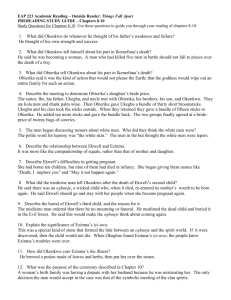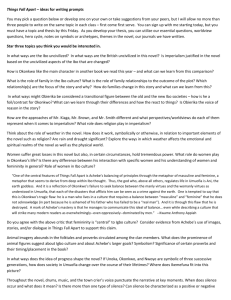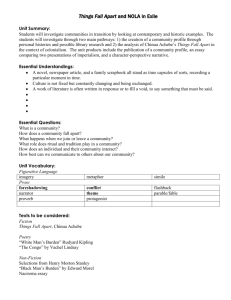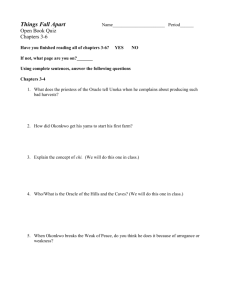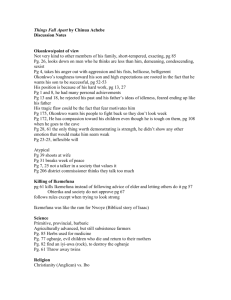Things Fall Apart: Okonkwo's Death - Text Analysis
advertisement
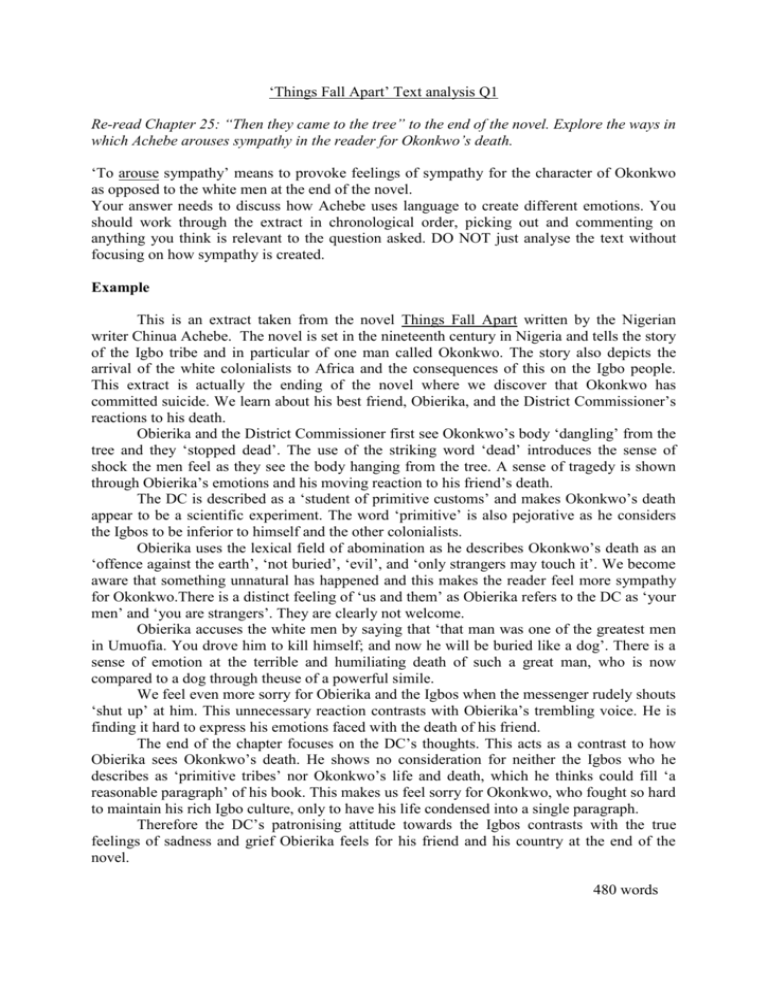
‘Things Fall Apart’ Text analysis Q1 Re-read Chapter 25: “Then they came to the tree” to the end of the novel. Explore the ways in which Achebe arouses sympathy in the reader for Okonkwo’s death. ‘To arouse sympathy’ means to provoke feelings of sympathy for the character of Okonkwo as opposed to the white men at the end of the novel. Your answer needs to discuss how Achebe uses language to create different emotions. You should work through the extract in chronological order, picking out and commenting on anything you think is relevant to the question asked. DO NOT just analyse the text without focusing on how sympathy is created. Example This is an extract taken from the novel Things Fall Apart written by the Nigerian writer Chinua Achebe. The novel is set in the nineteenth century in Nigeria and tells the story of the Igbo tribe and in particular of one man called Okonkwo. The story also depicts the arrival of the white colonialists to Africa and the consequences of this on the Igbo people. This extract is actually the ending of the novel where we discover that Okonkwo has committed suicide. We learn about his best friend, Obierika, and the District Commissioner’s reactions to his death. Obierika and the District Commissioner first see Okonkwo’s body ‘dangling’ from the tree and they ‘stopped dead’. The use of the striking word ‘dead’ introduces the sense of shock the men feel as they see the body hanging from the tree. A sense of tragedy is shown through Obierika’s emotions and his moving reaction to his friend’s death. The DC is described as a ‘student of primitive customs’ and makes Okonkwo’s death appear to be a scientific experiment. The word ‘primitive’ is also pejorative as he considers the Igbos to be inferior to himself and the other colonialists. Obierika uses the lexical field of abomination as he describes Okonkwo’s death as an ‘offence against the earth’, ‘not buried’, ‘evil’, and ‘only strangers may touch it’. We become aware that something unnatural has happened and this makes the reader feel more sympathy for Okonkwo.There is a distinct feeling of ‘us and them’ as Obierika refers to the DC as ‘your men’ and ‘you are strangers’. They are clearly not welcome. Obierika accuses the white men by saying that ‘that man was one of the greatest men in Umuofia. You drove him to kill himself; and now he will be buried like a dog’. There is a sense of emotion at the terrible and humiliating death of such a great man, who is now compared to a dog through theuse of a powerful simile. We feel even more sorry for Obierika and the Igbos when the messenger rudely shouts ‘shut up’ at him. This unnecessary reaction contrasts with Obierika’s trembling voice. He is finding it hard to express his emotions faced with the death of his friend. The end of the chapter focuses on the DC’s thoughts. This acts as a contrast to how Obierika sees Okonkwo’s death. He shows no consideration for neither the Igbos who he describes as ‘primitive tribes’ nor Okonkwo’s life and death, which he thinks could fill ‘a reasonable paragraph’ of his book. This makes us feel sorry for Okonkwo, who fought so hard to maintain his rich Igbo culture, only to have his life condensed into a single paragraph. Therefore the DC’s patronising attitude towards the Igbos contrasts with the true feelings of sadness and grief Obierika feels for his friend and his country at the end of the novel. 480 words




